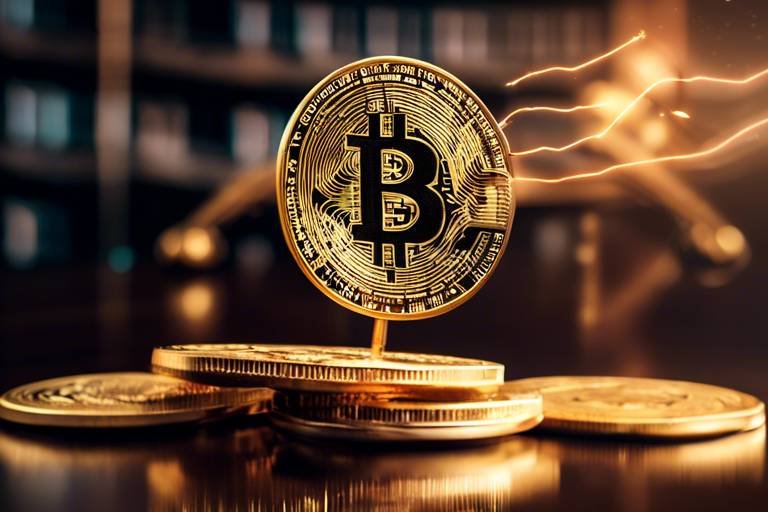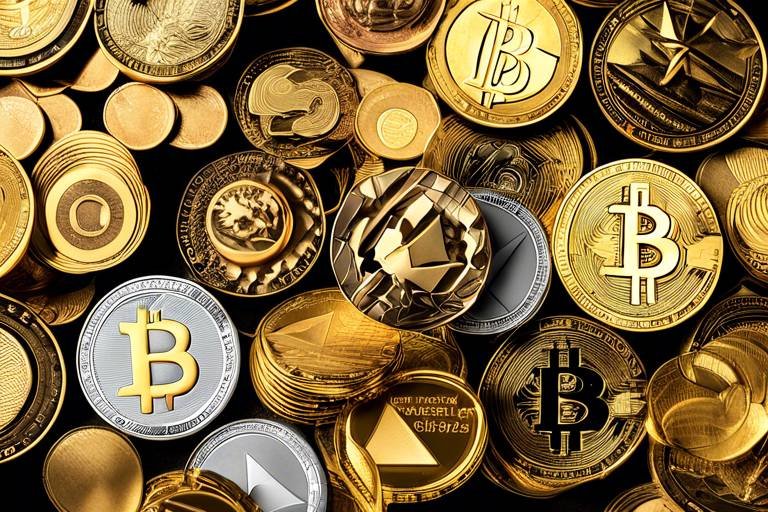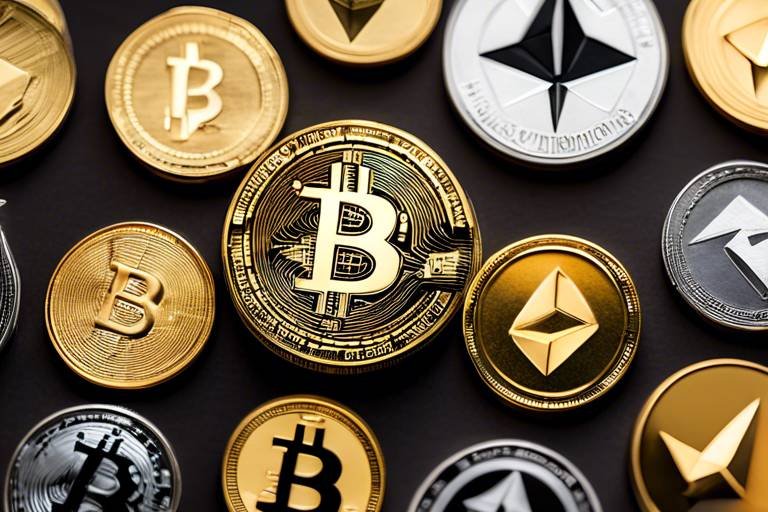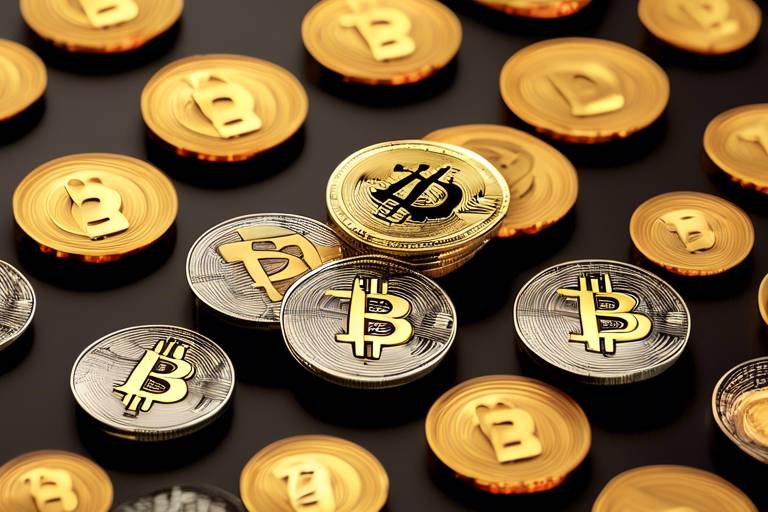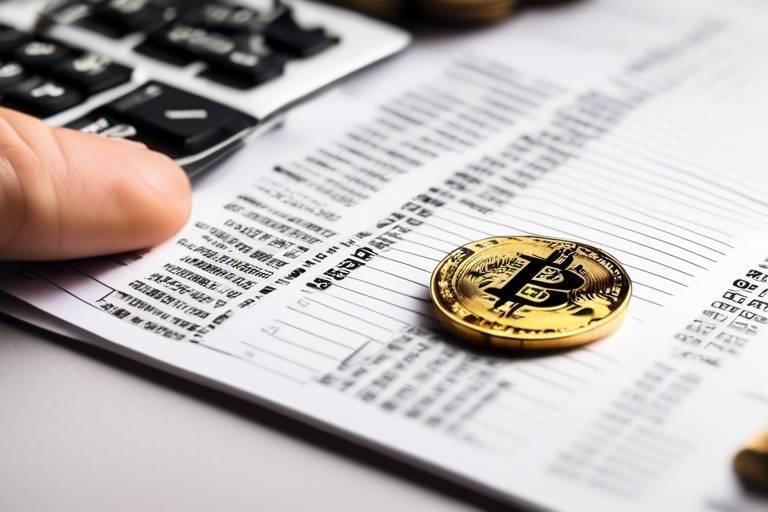Understanding the Legal Implications of Crypto Token Sales
The world of cryptocurrency is not just a digital frontier filled with opportunities; it’s also a complex landscape where legal implications loom large. As we dive into the intricacies of crypto token sales, it’s essential to grasp how regulations shape this market. The surge in popularity of cryptocurrencies has caught the attention of regulators globally, leading to a patchwork of laws that vary significantly from one jurisdiction to another. This article aims to unravel the legal nuances of crypto token sales, shedding light on the regulations that govern them, the types of tokens available, and the implications for both investors and companies.
In the realm of crypto token sales, understanding the regulatory framework is crucial. Various legislative bodies and regulatory agencies have stepped in to establish guidelines aimed at ensuring compliance and protecting consumers. For instance, in the United States, the Securities and Exchange Commission (SEC) plays a pivotal role in regulating token sales, particularly those that may qualify as securities. Meanwhile, the Financial Conduct Authority (FCA) in the UK has also introduced measures to oversee crypto activities. These organizations have developed a set of rules that token issuers must navigate to avoid legal pitfalls.
Across the globe, regulatory frameworks can differ dramatically. In some regions, authorities have embraced cryptocurrencies, allowing for a more lenient approach, while others have imposed strict bans. This inconsistency creates a challenging environment for companies looking to launch their tokens, as they must stay informed about the legal landscape in multiple jurisdictions.
When discussing crypto token sales, it’s vital to differentiate between the various types of tokens available in the market. Broadly speaking, tokens can be categorized into three main types: utility tokens, security tokens, and stablecoins. Each type comes with its own set of legal classifications and implications, making it essential for both issuers and investors to understand what they are dealing with.
Utility tokens are designed to provide users with access to a product or service within a specific ecosystem. They often serve as a means of facilitating transactions within a platform, making them an integral part of the operation. However, the legal considerations surrounding utility tokens can be complex. In many jurisdictions, the classification of utility tokens can lead to regulatory scrutiny, especially if they are perceived to have speculative value.
Different jurisdictions have varying interpretations of utility tokens. In some areas, they are classified as commodities, while in others, they may fall under securities regulations. This inconsistency can pose significant challenges for companies issuing utility tokens, as they need to ensure compliance with the specific laws of the regions they operate in. Understanding the legal status of these tokens is crucial for avoiding potential penalties and legal issues.
Investors looking to purchase utility tokens should be aware of the risks involved. The regulatory uncertainty surrounding these tokens can make them a gamble. For instance, if a utility token is later classified as a security, this could lead to investors facing unexpected losses. Additionally, the potential for losing investment value is always present, especially in a market as volatile as cryptocurrency.
On the other hand, security tokens are subject to much stricter regulations. These tokens represent ownership in an underlying asset, such as equity in a company or a stake in real estate. Because of their nature, security tokens must comply with securities laws, which include rigorous disclosure requirements and registration processes. This regulatory oversight is designed to protect investors by ensuring they have access to critical information before making investment decisions.
Investor protection is a significant concern in the world of crypto token sales. Regulatory bodies are tasked with ensuring that investors have access to necessary disclosures and rights. For instance, the SEC mandates that companies provide clear information about their token offerings, including potential risks and rewards. This transparency is vital for helping investors make informed decisions.
While there are protections in place, investors still face numerous risks when engaging in crypto token sales. The potential for fraud is high, especially in a market that lacks comprehensive regulation. Additionally, the lack of transparency in some token offerings can leave investors vulnerable to scams. The volatility of the cryptocurrency market further complicates matters, as prices can fluctuate wildly within short periods, leading to significant financial losses.
In cases of fraud or misrepresentation, investors do have legal avenues available to seek recourse. Depending on the nature of the fraud and the jurisdiction, investors may be able to file complaints with regulatory bodies or pursue legal action against the companies involved. Understanding these legal options is crucial for investors who find themselves in precarious situations.
As the cryptocurrency landscape continues to evolve, so too do the regulations governing it. Anticipated changes in the regulatory framework for crypto token sales could lead to more standardized laws across jurisdictions. This shift may provide clearer guidelines for companies and investors alike, fostering a more secure environment for crypto transactions. Regulatory bodies are likely to adapt their approaches as they gain a better understanding of the technology and its implications for the financial system.
- What are crypto tokens? Crypto tokens are digital assets created on a blockchain, used for various purposes, such as transactions or representing assets.
- How are utility tokens different from security tokens? Utility tokens provide access to a service or product, while security tokens represent ownership in an asset and are subject to securities regulations.
- What protections do investors have in crypto token sales? Investors are entitled to disclosures about risks, rights, and regulatory protections to safeguard their interests.
- Can investors take legal action in case of fraud? Yes, investors have legal recourse options available, including filing complaints with regulatory bodies or pursuing lawsuits.

The Regulatory Framework
In the ever-evolving world of cryptocurrency, understanding the regulatory framework surrounding crypto token sales is crucial for both investors and companies. With the rise of digital currencies, governments and regulatory bodies across the globe have scrambled to establish guidelines that protect consumers while fostering innovation. The challenge lies in striking a balance between regulation and the freedom that cryptocurrencies offer. So, what does this regulatory landscape look like?
At the core of the regulatory framework are various key legislations and regulatory bodies that govern the sale and distribution of crypto tokens. For instance, in the United States, the Securities and Exchange Commission (SEC) plays a pivotal role in determining whether a token is classified as a security or not. This classification is essential because it dictates the legal obligations that issuers must adhere to during a token sale. If a token is deemed a security, it must comply with the stringent requirements set forth by the SEC, including registration and disclosure obligations. On the other hand, utility tokens may escape some of these regulations, but they still face scrutiny to ensure they are not misleading to investors.
Across the pond, the European Union has been proactive in establishing its own set of regulations. The Markets in Crypto-Assets (MiCA) framework is designed to provide clarity and consistency across member states, ensuring that crypto assets are treated fairly and transparently. This legislation aims to protect consumers while allowing innovation to flourish, creating a safer environment for both investors and issuers.
But it’s not just about the laws; it’s also about compliance. Companies looking to launch a crypto token must navigate a complex web of regulations that often vary by jurisdiction. For example, while one country may classify a certain token as a utility, another might view it as a security. This inconsistency can lead to legal challenges and uncertainties, making it imperative for companies to seek legal counsel and ensure they are compliant with local laws.
Moreover, the impact of these regulations extends beyond just compliance; they also affect the overall market sentiment. When regulations are clear and fair, they can instill confidence in investors, leading to increased participation in the market. Conversely, excessive or unclear regulations can stifle innovation and drive companies to operate in less regulated jurisdictions, commonly referred to as "regulatory arbitrage."
To sum it up, the regulatory framework governing crypto token sales is a multifaceted and dynamic environment. As the market continues to grow and evolve, so too will the laws and regulations that shape it. Investors and companies alike must stay informed and adaptable to navigate this complex landscape effectively.

Types of Crypto Tokens
The world of cryptocurrency is as diverse as it is complex, and at the heart of this landscape lies the concept of crypto tokens. These digital assets can be categorized into several types, each serving distinct purposes and governed by different legal frameworks. Understanding these categories is crucial for both investors and companies venturing into the crypto space. In essence, crypto tokens can be broadly classified into three main types: utility tokens, security tokens, and stablecoins. Each type comes with its own set of characteristics, legal implications, and risks that investors should consider before diving in.
Utility tokens are designed to provide users with access to a product or service within a specific ecosystem. Imagine them as the gift cards of the crypto world, where holders can use these tokens to pay for services or products offered by a platform. However, the legal status of utility tokens can be murky. Different jurisdictions may classify them differently, leading to varying compliance requirements. For instance, in some regions, utility tokens might not be considered securities, while in others, they could fall under strict regulatory scrutiny. This inconsistency creates a landscape filled with regulatory uncertainty, which can be a significant risk factor for investors.
Next up are security tokens, which are fundamentally different from utility tokens. These tokens represent ownership in a real-world asset, such as stocks, bonds, or real estate. Security tokens are subject to stringent regulatory frameworks because they fall under the same category as traditional securities. This means that companies issuing security tokens must comply with various legal requirements, including registration with regulatory bodies and providing detailed disclosures to investors. The implications of this classification are profound, as failing to adhere to these regulations can lead to severe penalties for companies and potential losses for investors.
Finally, we have stablecoins, which aim to provide stability in an otherwise volatile market. These tokens are typically pegged to a stable asset, such as the US dollar or gold, and are designed to minimize price fluctuations. Think of them as the rock-solid foundation of the crypto world, providing a safe haven for investors looking to avoid the wild swings often seen in other cryptocurrencies. However, despite their stability, stablecoins also come with their own set of risks, particularly concerning regulatory scrutiny and the underlying assets' transparency. As governments and regulatory bodies increasingly focus on the implications of stablecoins, investors should remain vigilant about potential changes in the legal landscape.
In summary, the types of crypto tokens—utility tokens, security tokens, and stablecoins—each carry unique characteristics and legal implications that can significantly affect investors and companies alike. As the cryptocurrency market continues to evolve, understanding these distinctions will be vital for navigating the intricate web of regulations and ensuring compliance. In the next section, we will delve deeper into the legal considerations surrounding utility tokens, examining their purpose, risks, and the regulatory frameworks that govern them.

Utility Tokens
Utility tokens are a fascinating component of the cryptocurrency ecosystem, serving as a bridge between users and the services offered by various platforms. Unlike traditional currencies, utility tokens are not designed for investment but rather for providing access to a product or service. Think of them as the tickets you buy to enter a concert; they grant you access to something valuable, but they don't represent ownership of the venue itself. This unique characteristic raises important legal considerations that both issuers and investors must navigate.
When a company launches a utility token, it typically aims to create a specific use case within its platform. For instance, a gaming company might issue tokens that players can use to purchase in-game items or unlock exclusive features. However, the legal implications of these tokens can vary significantly depending on the jurisdiction. A key question arises: are these tokens merely tools for facilitating transactions, or do they inadvertently fall under the definition of securities?
In many regions, the classification of utility tokens can lead to regulatory scrutiny. For instance, the U.S. Securities and Exchange Commission (SEC) has been particularly vigilant in determining whether a token functions as a security. The infamous Howey Test, which assesses whether an investment contract exists based on the expectation of profits from the efforts of others, is often applied to evaluate utility tokens. If a token is deemed a security, it must comply with a host of regulatory requirements, complicating its sale and distribution.
Moreover, the legal status of utility tokens can also influence their marketability and acceptance. Companies must ensure that their token sales are compliant with local regulations to avoid hefty fines or legal action. This means drafting clear whitepapers that outline the token’s purpose, utility, and the risks involved. Transparency is crucial; without it, potential investors may shy away from participating in a token sale, fearing they might be caught in a regulatory quagmire.
Investors, too, face risks when purchasing utility tokens. The promise of a token providing access to a service can be enticing, but what happens if the service never materializes? Or if the company behind the token fails? Investors should conduct thorough due diligence before diving in. Understanding the inherent risks associated with utility tokens can help mitigate potential losses. These risks include:
- Regulatory Uncertainty: Changes in laws can impact the token's legal standing.
- Market Volatility: The value of utility tokens can fluctuate wildly, driven by demand and speculation.
- Project Viability: If the underlying platform fails, the token may lose all its value.
In conclusion, while utility tokens offer exciting opportunities for both companies and users, they come with a complex web of legal implications that must be navigated carefully. Understanding these nuances is essential for anyone looking to invest in or issue utility tokens, ensuring compliance and protecting both the issuer's and investors' interests.
What are utility tokens?
Utility tokens are digital assets that provide users with access to a product or service within a specific platform, rather than representing an investment in a company.
Are utility tokens considered securities?
The classification of utility tokens can vary by jurisdiction. In some cases, they may be classified as securities if they meet certain criteria, such as the expectation of profits from the efforts of others.
What risks are associated with investing in utility tokens?
Investors face several risks, including regulatory uncertainty, market volatility, and the potential failure of the underlying project.
How can I ensure compliance when issuing utility tokens?
To ensure compliance, companies should draft comprehensive whitepapers, seek legal advice, and stay informed about the regulatory environment in their jurisdiction.

Legal Status of Utility Tokens
The legal status of utility tokens is a topic that has garnered significant attention in recent years, especially as the cryptocurrency market continues to evolve. Utility tokens are designed to provide users with access to a product or service within a specific ecosystem, often functioning as a form of digital currency within that platform. However, the classification of these tokens varies across different jurisdictions, leading to a complex web of regulations that companies must navigate.
In many countries, utility tokens are not classified as securities, which means they may not be subject to the same stringent regulations that govern traditional financial instruments. For instance, in the United States, the Securities and Exchange Commission (SEC) has indicated that a token's utility and its purpose are critical in determining its legal status. If a utility token is primarily used for purchasing goods or services and does not offer a return on investment, it may fall outside the definition of a security. However, this is not a one-size-fits-all situation. The SEC may still scrutinize utility tokens to ensure they don’t inadvertently resemble securities, especially if they are marketed as investment opportunities.
In contrast, jurisdictions like Switzerland and Malta have developed more comprehensive frameworks that explicitly define utility tokens and their legal implications. In Switzerland, the Financial Market Supervisory Authority (FINMA) has issued guidelines that clarify how utility tokens can operate without being classified as securities, provided they meet specific criteria. These include ensuring that the token is used primarily for accessing a service and that it does not confer ownership or profit-sharing rights.
To illustrate the differences in legal status, consider the following table that outlines how various countries classify utility tokens:
| Country | Classification of Utility Tokens | Regulatory Body |
|---|---|---|
| United States | Not classified as securities if used primarily for utility | SEC |
| Switzerland | Defined under specific criteria; not securities | FINMA |
| Malta | Regulated under the Virtual Financial Assets Act | Malta Financial Services Authority |
| Singapore | Depends on the token's characteristics; may not be securities | Monetary Authority of Singapore |
Despite the potential for utility tokens to evade securities classification, companies issuing these tokens must still be cautious. Regulatory bodies are increasingly vigilant, and the lines between utility and security tokens can sometimes blur. If a utility token is marketed in a way that suggests it could appreciate in value, it may attract regulatory scrutiny, leading to potential legal challenges. This uncertainty can create a challenging environment for startups and established companies alike, as they must ensure compliance while still effectively marketing their products.
In conclusion, understanding the legal status of utility tokens is crucial for both issuers and investors. As the regulatory landscape continues to change, staying informed about the latest developments is essential to navigate the complexities of crypto token sales successfully. The implications of misclassification can be significant, leading to legal repercussions and financial losses. Therefore, companies must engage with legal experts to ensure they are following the appropriate guidelines and safeguarding their interests in the dynamic world of cryptocurrency.
- What are utility tokens? Utility tokens are digital assets designed to provide users with access to a specific product or service within a blockchain ecosystem.
- Are utility tokens considered securities? It depends on the jurisdiction and how the token is marketed. In some cases, they may be classified as securities, while in others, they may not.
- What should companies do to ensure compliance? Companies should consult with legal professionals knowledgeable in cryptocurrency regulations to navigate the complexities of utility token sales.
- What risks do investors face with utility tokens? Investors may face risks such as regulatory uncertainty, potential loss of investment value, and lack of consumer protections.

Risks Associated with Utility Tokens
When diving into the world of utility tokens, it's essential to understand that while they can offer exciting opportunities, they also come with a unique set of risks. Think of utility tokens as the tickets to a concert; they grant you access to a specific event, but what happens if the concert gets canceled? Similarly, utility tokens are designed for specific use cases within a blockchain ecosystem, but their value can fluctuate dramatically based on various factors.
One of the primary risks associated with utility tokens is regulatory uncertainty. Since the legal framework surrounding cryptocurrency is still evolving, the classification of utility tokens can vary significantly from one jurisdiction to another. This inconsistency can lead to sudden regulatory changes that might impact the token's usability or legality. For instance, a utility token that is deemed compliant today might face scrutiny tomorrow, leaving investors in a precarious position.
Moreover, the lack of transparency in many token sales can heighten the risks for investors. Often, the whitepapers that describe the token's purpose and the project's roadmap can be vague or overly optimistic, leading to potential misinformation. Without clear and accurate information, investors may find themselves buying into projects that are not as viable as they initially appeared. This situation can be likened to purchasing a product based solely on flashy advertising without understanding its actual functionality.
Another critical risk is the likelihood of losing investment value. The cryptocurrency market is notoriously volatile, and utility tokens are no exception. Prices can soar to incredible heights, only to plummet just as quickly. This unpredictability can be devastating for investors who may find themselves holding tokens that are worth significantly less than what they initially paid.
Additionally, there's the risk of project failure. Many utility tokens are associated with startups that may not have a proven track record. If the project fails to deliver on its promises or goes bankrupt, the tokens can become worthless. Investors need to conduct thorough due diligence before committing their funds to any utility token project. This involves not only examining the project's fundamentals but also understanding the team behind it and their ability to execute the vision.
Lastly, the potential for fraud cannot be overlooked. As the cryptocurrency market grows, so does the number of scams and fraudulent projects. Unscrupulous individuals may create fake utility tokens to lure in unsuspecting investors, leading to significant financial losses. It's crucial for investors to remain vigilant and skeptical, ensuring they are investing in legitimate projects with transparent operations.
In summary, while utility tokens can offer unique opportunities within the blockchain ecosystem, they also come with inherent risks that investors must carefully consider. From regulatory uncertainties to the potential for fraud, being informed and cautious can make all the difference in navigating this exciting yet unpredictable landscape.
- What are utility tokens? Utility tokens are digital assets designed to provide access to a specific product or service within a blockchain ecosystem.
- Are utility tokens regulated? The regulatory status of utility tokens varies by jurisdiction and is subject to change as laws evolve.
- What risks should I consider when investing in utility tokens? Key risks include regulatory uncertainty, lack of transparency, potential loss of investment value, project failure, and the risk of fraud.
- How can I protect myself when investing in utility tokens? Conduct thorough research, understand the project, and be cautious of overly optimistic claims.

Security Tokens
Security tokens represent a significant evolution in the cryptocurrency landscape, acting as digital representations of ownership in real-world assets. Unlike utility tokens, which provide access to a service or product, security tokens are designed to be investment vehicles, much like traditional stocks or bonds. They are subject to rigorous regulatory scrutiny, which is crucial for maintaining investor confidence and ensuring compliance with securities laws. Essentially, these tokens are a bridge between the traditional financial system and the burgeoning world of blockchain technology.
When we talk about security tokens, we often reference their ability to encapsulate various forms of assets, such as equity, debt, or even real estate. This flexibility opens up a myriad of possibilities for investors, allowing them to diversify their portfolios with tokenized assets. However, the legal requirements surrounding the issuance and trading of security tokens can be complex and vary significantly across jurisdictions. Companies must navigate these legal waters carefully to avoid hefty fines or legal repercussions.
One of the primary characteristics of security tokens is their compliance with existing securities regulations. This means that any token sale must adhere to specific guidelines set forth by regulatory bodies, such as the Securities and Exchange Commission (SEC) in the United States. For instance, a company planning to launch a security token must register the offering unless it qualifies for an exemption. This registration process involves extensive disclosures about the company's financial health, the risks associated with the investment, and the rights of the token holders.
Moreover, the legal landscape for security tokens is continuously evolving. As more companies explore the issuance of these tokens, regulators are working to establish clearer guidelines to protect investors while fostering innovation. This dynamic environment means that investors must stay informed about the regulatory framework in their respective jurisdictions. For example, while some countries have embraced security tokens and created favorable regulations, others remain skeptical, imposing stringent restrictions that can stifle growth.
In conclusion, security tokens play a crucial role in the future of finance, offering a compliant and innovative way for companies to raise capital while providing investors with new opportunities. However, the complexities of their legal classification and regulatory requirements necessitate a thorough understanding from both issuers and investors. As the market matures, we can expect to see clearer regulations that will pave the way for broader adoption of security tokens, ultimately reshaping the investment landscape.
- What are security tokens? Security tokens are digital representations of ownership in real-world assets, subject to securities regulations.
- How are security tokens different from utility tokens? While utility tokens provide access to a service or product, security tokens are investment vehicles akin to stocks or bonds.
- What regulatory bodies oversee security token sales? In the U.S., the Securities and Exchange Commission (SEC) is the primary regulatory body, but other countries have their own regulations.
- Are security tokens safe for investors? While they offer compliance with regulations, investors should still conduct due diligence to understand the risks involved.

Investor Protections
In the rapidly evolving landscape of cryptocurrency, have become a critical concern. With the rise of crypto token sales, many investors are eager to dive into this new world, but it’s essential to understand the safeguards in place to protect them. Regulatory bodies, such as the U.S. Securities and Exchange Commission (SEC) and the Financial Conduct Authority (FCA) in the UK, have established guidelines aimed at ensuring transparency and accountability in crypto transactions. These regulations serve as a backbone for investor confidence, helping to mitigate risks associated with the often volatile crypto market.
One of the primary forms of protection is the requirement for disclosures. Companies conducting token sales are typically mandated to provide comprehensive information about their operations, the technology behind their tokens, and the potential risks involved. This transparency is crucial for investors to make informed decisions. For instance, if a company fails to disclose its financial health or the specifics of its project, it could be held liable for misrepresentation, allowing investors to seek legal recourse.
Additionally, regulatory bodies play a pivotal role in safeguarding investor interests. They monitor token sales to ensure compliance with existing laws and regulations, which can include anti-fraud measures and consumer protection laws. This oversight helps to create a more structured environment, where investors can feel secure knowing that there are rules in place to protect them from deceptive practices.
Moreover, the legal framework surrounding crypto token sales often includes specific rights for investors. For example, investors may have the right to withdraw their investments within a certain period after the purchase, especially if they feel misled by the information provided. This right of rescission is a vital aspect of consumer protection, allowing investors to exit a potentially harmful investment.
However, it’s important to note that while these protections exist, they are not foolproof. Investors must remain vigilant and conduct thorough due diligence before participating in any token sale. The cryptocurrency market is still relatively young, and regulatory measures are continuously evolving. Therefore, understanding the nuances of investor protections can be the difference between a successful investment and a costly mistake.
In summary, while the landscape for investor protections in crypto token sales is improving, it remains essential for investors to stay informed and proactive. By understanding the regulations, knowing their rights, and being aware of the risks involved, investors can better navigate the complexities of the cryptocurrency market.
- What are the main protections for investors in crypto token sales? Investors are protected through regulatory disclosures, monitoring by regulatory bodies, and specific rights like the right to rescind investments.
- How can I ensure a token sale is legitimate? Conduct thorough research on the company, review their whitepaper, and look for regulatory compliance.
- What should I do if I feel misled by a token sale? You may have legal recourse to seek compensation, so consult with a legal professional familiar with cryptocurrency regulations.
- Are all token sales regulated? Not all token sales are regulated; it varies by jurisdiction, so always check local laws.

Risks for Investors
Investing in crypto token sales can feel like riding a roller coaster—thrilling, unpredictable, and sometimes downright scary. While the potential for high returns can be alluring, it’s crucial to recognize the risks that come along with this digital gold rush. One of the primary concerns is the lack of regulation surrounding many token sales. Unlike traditional investments that are often backed by stringent laws and regulations, the crypto space is still evolving, which can leave investors vulnerable to various pitfalls.
One of the most alarming risks is the potential for fraud. The anonymity and decentralization that make cryptocurrencies appealing also create opportunities for bad actors to exploit unsuspecting investors. Imagine walking into a store that sells “magic beans” with promises of instant wealth. Without proper oversight, it’s all too easy to fall for a scam. In fact, many investors have lost significant amounts of money due to fraudulent schemes masquerading as legitimate token sales. According to recent reports, scams in the crypto space have led to billions in losses, leaving investors with little recourse.
Another risk is the lack of transparency in many projects. While some token sales provide detailed whitepapers outlining their objectives and technology, others are vague at best. This opacity can make it difficult for investors to assess the viability of a project. It’s like trying to read a book with half the pages missing—you’re left guessing about the plot and outcomes. The absence of clear information can lead to poor investment decisions, as investors may not fully understand what they are buying into.
The volatility of the cryptocurrency market is another significant risk that investors must consider. Prices can swing wildly within a matter of hours, influenced by factors such as market sentiment, regulatory news, and technological developments. For instance, a token that surges to an all-time high one day could plummet the next, leaving investors in a state of panic. This unpredictability can lead to substantial financial losses, especially for those who are not prepared for the emotional roller coaster that comes with trading in this space.
Moreover, the regulatory landscape is constantly changing, which can create uncertainty for investors. New laws and regulations can impact the legality and operation of token sales, potentially rendering previously legitimate projects non-compliant. It’s a bit like playing a game where the rules are frequently changed; just when you think you understand how to play, the game shifts, and you’re left scrambling to adapt. Investors need to stay informed and be ready to pivot as regulations evolve.
To summarize, here are some key risks that investors should keep in mind when participating in crypto token sales:
- Fraud: The risk of falling victim to scams and fraudulent token offerings.
- Lack of Transparency: Insufficient information about projects can lead to poor investment choices.
- Market Volatility: Rapid price fluctuations can result in significant financial losses.
- Changing Regulations: New laws can impact the legality and compliance of token sales.
In conclusion, while the world of crypto token sales presents exciting opportunities, it also comes with its fair share of risks. Investors must approach these ventures with caution, conduct thorough research, and be prepared for the unexpected. By understanding these risks, you can better navigate the complex landscape of cryptocurrency investments.
- What is a crypto token? A crypto token is a digital asset created on a blockchain, often representing a unit of value or utility within a specific ecosystem.
- Are all crypto tokens the same? No, there are different types of tokens, including utility tokens, security tokens, and stablecoins, each with unique characteristics and legal implications.
- What should I consider before investing in a token sale? Always research the project, understand its purpose, assess the team behind it, and be aware of the associated risks.
- How can I protect myself from fraud in crypto investments? Look for projects with transparency, read reviews, and only invest in reputable token sales. Always be skeptical of promises that seem too good to be true.

Legal Recourse for Investors
In the fast-paced world of cryptocurrency, the allure of high returns can sometimes overshadow the potential risks involved, particularly when it comes to crypto token sales. As an investor, it’s crucial to understand that while opportunities abound, so do the challenges, especially in the realm of legal recourse. If you find yourself in a situation where you’ve been misled or defrauded during a token sale, knowing your rights and the available legal avenues can be a game-changer.
First and foremost, it’s important to recognize that not all token sales are created equal. The legal frameworks governing these sales can vary significantly depending on the jurisdiction. In many countries, securities laws apply to certain types of tokens, especially security tokens, which means that investors may have specific rights under these laws. For instance, if a token is classified as a security, investors are entitled to certain disclosures and protections that are designed to ensure transparency and fairness.
For investors who feel that they have been wronged, there are several pathways to seek legal recourse:
- Filing a Complaint: Many countries have regulatory bodies that oversee financial transactions, including crypto token sales. Filing a complaint with these organizations can initiate an investigation into the practices of the token issuer.
- Civil Litigation: If you believe you have suffered financial losses due to fraud or misrepresentation, you may consider pursuing a civil lawsuit against the parties involved. This could include the token issuer, advisors, or even exchanges that facilitated the sale.
- Class Action Lawsuits: In situations where multiple investors have been affected by the same issue, joining a class action lawsuit can be an effective way to seek compensation. This approach allows investors to pool their resources and share the costs of litigation.
Moreover, it's essential to gather all relevant documentation related to the token sale. This includes transaction records, promotional materials, and any communication with the token issuer. Having a well-documented case can significantly strengthen your position, whether you’re negotiating a settlement or pursuing litigation.
In addition to these legal avenues, investors should also be aware of the importance of staying informed about the evolving regulatory landscape. As governments around the world continue to adapt their laws to better address the challenges posed by cryptocurrencies, new protections for investors may emerge. Keeping abreast of these changes can provide additional options for recourse in the future.
Ultimately, while the world of crypto token sales can be fraught with risks, understanding your legal rights and the recourse available to you is crucial. By being proactive and informed, you can better navigate the complexities of this exciting yet unpredictable market.
- What should I do if I suspect fraud in a crypto token sale? If you suspect fraud, gather all related documentation and consider filing a complaint with relevant regulatory authorities. Consulting with a legal expert can also provide guidance on your next steps.
- Are all crypto tokens subject to the same regulations? No, the regulatory status of crypto tokens varies by jurisdiction and depends on their classification as utility or security tokens.
- Can I join a class action lawsuit for losses incurred in a token sale? Yes, if multiple investors have been similarly affected, you may join a class action lawsuit to seek compensation collectively.

Future Trends in Regulation
The landscape of cryptocurrency regulation is evolving at a breakneck pace, and it’s crucial for both investors and companies to stay ahead of the curve. As governments and regulatory bodies around the world grapple with the implications of blockchain technology and digital assets, we can expect several trends to emerge in the near future. One of the most significant trends is the push for a more unified global regulatory framework. Currently, different jurisdictions have varying laws and guidelines, leading to a patchwork of regulations that can confuse investors and businesses alike. Imagine trying to navigate a maze where every turn leads to a different set of rules—frustrating, right? A harmonized approach would not only simplify compliance but also enhance consumer protection across borders.
Another trend is the increasing focus on decentralized finance (DeFi) and its regulatory implications. As DeFi platforms gain traction, regulators are keen to understand how these technologies function and what risks they pose to investors. This scrutiny could lead to new regulations specifically tailored to address the unique challenges posed by DeFi, such as the lack of intermediaries and the potential for smart contract vulnerabilities. As we move forward, companies engaged in DeFi will need to be proactive in demonstrating their compliance with evolving standards, or risk facing penalties that could stifle innovation.
Moreover, we are likely to see enhanced consumer protection measures. Regulators are becoming increasingly aware of the risks associated with crypto token sales, including fraud and market manipulation. This awareness is likely to translate into stricter disclosure requirements, where companies will need to provide comprehensive information about their projects and any associated risks. Imagine being handed a map before entering a dense forest; that’s what these disclosures aim to do—guide investors through the complexities of crypto investments.
Another area to watch is the role of self-regulatory organizations (SROs). As the cryptocurrency market matures, we may see the establishment of SROs that set industry standards and best practices. These organizations could play a pivotal role in ensuring compliance and fostering trust among investors, similar to how the Financial Industry Regulatory Authority (FINRA) operates in traditional finance. By adopting a self-regulatory approach, the crypto industry can demonstrate its commitment to ethical practices and consumer protection, potentially alleviating some regulatory burdens from governmental bodies.
Lastly, we can anticipate technological advancements influencing regulatory practices. The rise of blockchain analytics tools enables regulators to monitor transactions more effectively, thereby enhancing their ability to detect fraudulent activities and enforce compliance. This technology could lead to a more transparent ecosystem, where bad actors find it increasingly difficult to operate undetected. As regulators become more tech-savvy, the relationship between technology and regulation will likely become more symbiotic, paving the way for a safer and more secure crypto environment.
In conclusion, the future of crypto regulation is poised for significant changes that will impact everyone involved in the cryptocurrency space. From unified global frameworks to enhanced consumer protections and the rise of SROs, the next few years will be crucial for shaping a more secure and compliant environment for crypto token sales. Companies and investors alike must stay informed and adaptable to navigate this ever-changing landscape.
- What is the importance of regulatory compliance in crypto token sales? Regulatory compliance helps protect investors and ensures that companies operate within the law, fostering trust in the cryptocurrency market.
- How can investors stay informed about regulatory changes? Investors should follow news from reliable sources, subscribe to updates from regulatory bodies, and engage with industry forums to stay abreast of changes.
- What role do self-regulatory organizations play? SROs set industry standards and best practices, helping to maintain ethical behavior and compliance within the cryptocurrency market.
Frequently Asked Questions
- What are crypto token sales?
Crypto token sales are fundraising events where new cryptocurrencies or tokens are sold to investors, often to raise capital for a project. Think of it like an initial public offering (IPO) but for digital assets. These sales can take various forms, including Initial Coin Offerings (ICOs), Security Token Offerings (STOs), and more.
- What is the difference between utility tokens and security tokens?
Utility tokens are designed to provide users with access to a product or service within a blockchain ecosystem. They are not classified as investments. On the other hand, security tokens represent ownership in an asset or company and are subject to regulatory scrutiny, much like traditional securities.
- How are crypto token sales regulated?
Regulation of crypto token sales varies by jurisdiction. In many countries, regulatory bodies like the SEC in the United States oversee these sales to ensure compliance with securities laws. This means that companies must adhere to strict guidelines to protect investors and maintain transparency.
- What risks do investors face in crypto token sales?
Investors in crypto token sales face several risks, including the potential for fraud, lack of transparency, and the inherent volatility of the cryptocurrency market. It's crucial to conduct thorough research and understand the project behind the token before investing.
- Can I get my money back if I lose it in a crypto token sale?
Recovering funds from a failed or fraudulent crypto token sale can be challenging. Legal recourse may be available, but it often depends on the specific circumstances and the jurisdiction in which the sale occurred. Always consult with a legal professional for advice.
- What are the legal implications of participating in a crypto token sale?
Participating in a crypto token sale can have legal implications, especially if the tokens are classified as securities. Investors should be aware of the regulations in their jurisdiction and the responsibilities of the token issuer to ensure compliance and protect their interests.
- What future trends can we expect in crypto regulation?
The regulatory landscape for crypto token sales is evolving rapidly. We can expect more comprehensive regulations aimed at protecting investors and ensuring market stability. This may include clearer guidelines for what constitutes a security and enhanced compliance requirements for token issuers.

